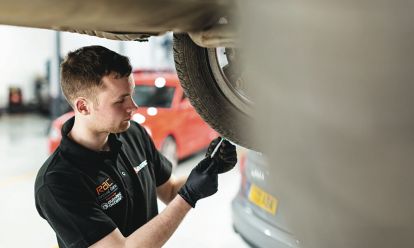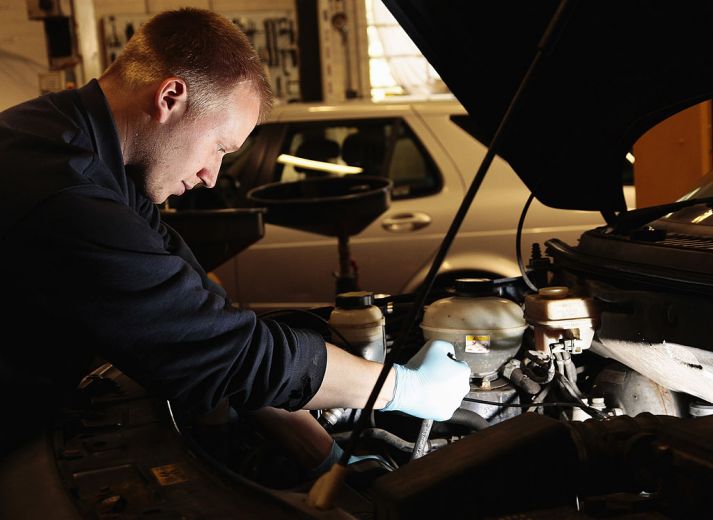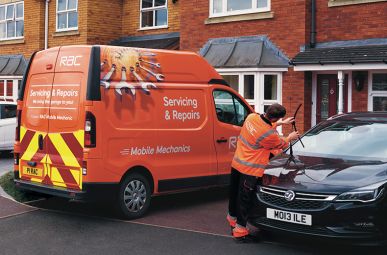Although the regularity of a service can vary due to manufacturer, type of vehicle, and how far it has been driven in a year – there are some important factors you will need to consider.
Many new and modern vehicles may not need a full service, but it is worth keeping it in optimum condition.
By servicing your car regularly, you will save money in the long run by avoiding major breakdowns and costly repairs.
A short guide to car servicing
Simply put, a car service is a series of maintenance and repair procedures that are carried out on the vehicle after it has travelled a certain number of miles or after a set period of time.
The manufacturer of the vehicle will state what is best for the car you are driving and how often a service should be carried out.
Servicing is important to keep your car in the best shape possible, save you from expensive repair bills, and save you cash in the long run.
Most manufacturers recommend having a full car service once a year or every 12,000 miles, whichever comes first. But this depends on your car and how you drive it.
You can check your service book to see when your car was last serviced – and it should be updated or stamped by the mechanic after completion of a service. If your car has a paperless, digital history then you may need to contact the garage or dealership that carried out the service to find out when it was previously completed.
In vehicles with modern, on-board computer systems, it will let you know when a service is due and if there are any faults to be wary of. Even if this appears before 12 months or every 12,000 miles, you shouldn’t ignore it and get it sorted.
Normally, a service will take up to three hours to complete.
A car service is not the same as MOT, which is a legal, annual requirement to ensure your vehicle is road legal.
Regular servicing will also help improve fuel efficiency and have peace of mind that your car is in the best possible condition, and keep it running for a longer period of time.
Check out our MOT Checklist and comprehensive guide to learn more.
Service, repair or MOT?
You can trust the RAC with our local approved garages and NEW mobile mechanics.


How often should I service my car?
The table below summarises the best practices for car servicing. These are suggested intervals – but if you think your car is in need of a service, contact a local garage today.
| Service type | Service Interval |
|---|---|
| Regular maintenance | When your oil and filter need replacing |
| Interim service | Every 6 months or 6,000 miles, whichever comes first |
| Full service | Every 12 months or 12,000 miles, whichever comes first |
| Manufacturer service | As per your manufacturer’s service schedule – check your manual |
Regular maintenance
You should get your vehicle checked out on a more regular basis if you need to top up your ‘consumable items’. This can include changing your oil or oil filters – but also radiator coolants, brake fluid, wiper blades, brake pads, power steering fluid, spark plugs, and other filters/fluids to keep your car running smoothly. This type of maintenance may also include checks on the hoses and pipes that transfer the fluids.
Interim service
This is a less comprehensive version of a full service, and is designed to be carried about by an engineer every 6 months or 6,000 miles – whichever comes first. This should not replace a full service, and is helpful in removing any issues before they become more severe. An interim service includes a 50-point inspection, an engine oil change and new oil filter being installed.
Full service
This is the largest type of service available. It will include a full inspection, and will need to be done every 12 months or 12,000 miles – again, whichever comes first. The service will also include changes to engine oil, oil filters, and air filters. During a full service, a mechanic will analyse all the vital parts of the car, along with the safety and mechanical systems. For both interim and full services, they will replace items that have a certain lifespan, which if not dealt with can cause major issues.
Manufacturer service
For higher spec vehicles, it is advisable in some cases to have a manufacturer's service. This is a service schedule set out by the car’s creators, to ensure that it is maintained in-line with the recommendations they have set out. You will need to take the car to a dealership/garage that is owned or managed by your vehicle manufacturer. All work and parts used are from the manufacturers and the technicians are qualified by them as well.
You can keep on track with your car's maintenance and save money by getting a Service and MOT plan to spread the cost over two years.
What will you need to bring to a service?
In order for a mechanic to proceed with a service on your vehicle, there are three things you will need.
1. First of all, make sure that you have you alloy wheel keys or locking nuts. The person carrying out the service will need these in order to remove the wheel. They cannot check the status of your suspension or steering systems without them.
2. Clear your car of all clutter – especially in the boot. If your vehicle has a spare tyre, then it will need to be checked. It also helps clearing out the car of anything that may make it difficult for the technician.
3. Your service book. Make sure it is in your glove box before booking a service! A mechanic will need to see when any work was carried out on the car – and what was needed. All information relating to the vehicle is kept in this log.
What can you do throughout the year?
Although servicing your vehicle is very important for the reasons outlined in this guide, there are many actions you can take throughout the year to help your vehicle stay in the best condition possible.
There are many signs that your car needs a service, including dashboard warning lights, strange noises, leaks, loss of power, inconsistent performance, and more serious signs – such as breakdowns and smoke coming from the engine. These should all be addressed by a professional as soon as you can.
The RAC has put together a list of 12 essential car maintenance checks you should be doing throughout the year.
When it comes to preventing a breakdown, remember the acronym FORCES, which stands for Fuel, Oil, Rubber, Coolant, Electrics, Screen wash.
Even though it is highly unlikely to impact performance, you can remove scratches from your paintwork to keep the vehicle looking as good as new.
All of this is to help keep your car in the best condition throughout the year – ensuring you are road legal and safe to all road users.
So, with this in mind, these tips on making your car last longer, will also help alongside regular servicing.

Mobile mechanics – can they service your vehicle?
It is well known that when you need an MOT and/or service – you visit your local garage. However, there is now another option.
You can have the garage brought to you through a mobile mechanic.
Once you have booked your time, the technician will come to your home or place of work and carry out the necessary work on your vehicle at your convenience.
A mobile mechanic can carry out almost as many tasks as a garage can – by operating out of their van. Although they cannot perform an MOT – they can service your vehicle.
Whether it is an oil and filter change, an interim service, or a full comprehensive service, a mobile mechanic can help.
The RAC have recently launched a new service to its customers – RAC Mobile Mechanic.
Find an RAC Mobile Mechanic near you today – book now.

Hurry! Offer ends 15/05/24, 7am.
*Use code SAVE33 on Extra and Complete cover for 1 vehicle or person. New customers only. Ends 15/05/24, 7am. ^£7.00 for Basic cover, not in sale.











